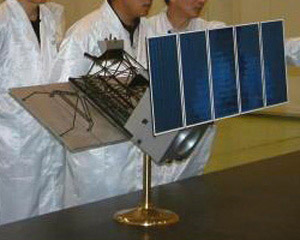 A Long March 4C carrier rocket carrying a remote-sensing satellite, "Yaogan IX", blasts off from the Jiuquan Satellite Launch Center in northwest China's Gansu Province. (photo : Xinhua)
A Long March 4C carrier rocket carrying a remote-sensing satellite, "Yaogan IX", blasts off from the Jiuquan Satellite Launch Center in northwest China's Gansu Province. (photo : Xinhua)China successfully launched another Earth observation satellite from the Jiuquan space base Friday, according to state-run media outlets.
 The Yaogan Weixing-9 spacecraft blasted off from Jiuquan on a Long March 4C rocket at 0455 GMT (11:55 p.m. EST Thursday), or 12:55 p.m. local time. The three-stage rocket successfully delivered the secret payload to orbit, the state-owned Xinhua news agency reported.
The Yaogan Weixing-9 spacecraft blasted off from Jiuquan on a Long March 4C rocket at 0455 GMT (11:55 p.m. EST Thursday), or 12:55 p.m. local time. The three-stage rocket successfully delivered the secret payload to orbit, the state-owned Xinhua news agency reported.
The Jiuquan launch site is located in the Gobi desert near the border between China's Gansu and Inner Mongolia provinces. Jiuquan has hosted the launches of all three Chinese human spaceflights to date.
Yaogan 9 is the newest member of a series of satellites believed to harbor optical and radar military reconnaissance capabilities.
The satellite "would be used to conduct scientific experiment[s], carry out surveys on land resources, forecast grain output and help with natural disaster-reduction and prevention endeavor[s]," state media reports said.
But most experts believe the Yaogan series includes two variants with high-resolution electro-optical cameras and cloud-piercing radars designed to see targets through inclement weather or darkness.
In the past, optical Yaogan satellites launched from Jiuquan and radar-equipped spacecraft were shot into orbit from the Taiyuan space center in northern China's Shanxi province.
Before Friday's mission, analysts believed China had orbited three electro-optical Yaogan satellites and five radar payloads.
Previous Yaogan launches from Jiuquan used the less powerful Long March 2D booster. The Long March 4C launched Friday includes a restartable third stage to increase payload performance. Chinese officials did not address the change in rocket, but the more powerful launcher could indicate the mission carried an upgraded Yaogan satellite.
Official Chinese media did not announce the launch until Thursday, a typical communications procedure for closely-guarded military space missions.
Friday's launch was the second orbital flight of Chinese rockets this year, and it marked the ninth space launch to reach orbit worldwide so far in 2010.
 The Yaogan Weixing-9 spacecraft blasted off from Jiuquan on a Long March 4C rocket at 0455 GMT (11:55 p.m. EST Thursday), or 12:55 p.m. local time. The three-stage rocket successfully delivered the secret payload to orbit, the state-owned Xinhua news agency reported.
The Yaogan Weixing-9 spacecraft blasted off from Jiuquan on a Long March 4C rocket at 0455 GMT (11:55 p.m. EST Thursday), or 12:55 p.m. local time. The three-stage rocket successfully delivered the secret payload to orbit, the state-owned Xinhua news agency reported.The Jiuquan launch site is located in the Gobi desert near the border between China's Gansu and Inner Mongolia provinces. Jiuquan has hosted the launches of all three Chinese human spaceflights to date.
Yaogan 9 is the newest member of a series of satellites believed to harbor optical and radar military reconnaissance capabilities.
The satellite "would be used to conduct scientific experiment[s], carry out surveys on land resources, forecast grain output and help with natural disaster-reduction and prevention endeavor[s]," state media reports said.
But most experts believe the Yaogan series includes two variants with high-resolution electro-optical cameras and cloud-piercing radars designed to see targets through inclement weather or darkness.
In the past, optical Yaogan satellites launched from Jiuquan and radar-equipped spacecraft were shot into orbit from the Taiyuan space center in northern China's Shanxi province.
Before Friday's mission, analysts believed China had orbited three electro-optical Yaogan satellites and five radar payloads.
Previous Yaogan launches from Jiuquan used the less powerful Long March 2D booster. The Long March 4C launched Friday includes a restartable third stage to increase payload performance. Chinese officials did not address the change in rocket, but the more powerful launcher could indicate the mission carried an upgraded Yaogan satellite.
Official Chinese media did not announce the launch until Thursday, a typical communications procedure for closely-guarded military space missions.
Friday's launch was the second orbital flight of Chinese rockets this year, and it marked the ninth space launch to reach orbit worldwide so far in 2010.
Source by : STEPHEN CLARK (SPACEFLIGHT NOW)


0 comments:
Post a Comment